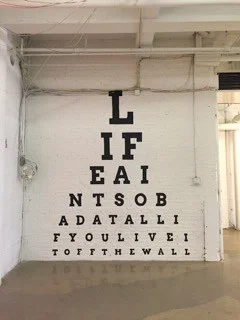…and Ride a Path to Authentic Health
As we’re approaching the end of January, aka National Dieting Month, it’s time to break the news: Diets don’t work.
Although the term “diet” has fallen out of favor, for very good reasons, “the concept of dieting is alive and well,” says Kelsey Miller, in her last installment of Refinery29’s wildly popular Anti-Diet Project. Now we call it eating “clean,” she says.
You may say you’re not dieting but still engaged in the never-ending “body project” and eating “for health,” which is intricately tied, in most people’s eyes, to losing weight. (It’s not.)
Dieting is often chosen by people to chase their dreams of confidence and likability. “Once I lose x number of pounds, I’ll finally get the lover/job/life I want.” It’s called magical thinking.
What’s magical to me, is how the monstrous $60 billion per year diet industrial complex has thrived so well when failure is inevitable for 95% of those that buy-in to the promises it peddles. And somehow those consumers blame themselves, not the product.
What is the Diet Cycle?
Thin = Win Belief
The diet cycle begins with the desire to be thin. Popular media and our patriarchal culture has us, especially women, conditioned to believe that being thin is the primary measure of attractiveness and therefore worth. But the reality is that this narrow standard of beauty is difficult, if not impossible, for all but a lucky few, due to our natural diversity in genetic makeup and life circumstances.
This pursuit of thinness has become a moral imperative for many people who have been crudely categorized as “overweight” or “obese” by the overreaching Body Mass Index, or BMI, itself an imprecise and arbitrary height and weight formula devised by a statistician in 1918 to assess the collective weight of a population and explicitly not for use for individuals nor to assess health.Even many of those in the so-called “ideal weight range” pursue dieting, by constantly monitoring and denying themselves because they are not “thin enough” or because they have a deep fear of becoming fat.
Waist Reduction
This desire to be thin and fear of being fat naturally leads to dieting, the most common, if not the only, “remedy” known for the body that is viewed as “wrong” because of its size. Dieting is the self-imposition of a caloric deficit by either restricting calories consumed or increasing calories expended for the purposes of losing weight. Restriction may be through counting calories; or by denying oneself certain foods (ice cream), types of foods (sugar or wheat), or entire food groups (grains or dairy), that by subtraction leads to fewer calories consumed.
Initially, any loss feels so intoxicating! The scale confirms how “good” you are, and the high-fives from co-workers compels you onward.
Obsession Sets In
Our body handles the famine (not knowing it’s self-imposed) by kicking in intricate physiological, psychological, neurological, and hormonal changes all designed to get you to eat in order to keep you alive. So cool!
Minnesota’s own Ancel Keys did some of the most significant research on what happens to physically and mentally healthy men, in this case, conscientious objectors in WW2 when a significant amount of weight is intentionally lost. The men became obsessed with food, persistently talking about it and their strong food cravings. Some started collecting recipes, stealing food, or deliberately exercising more to get additional rations. Their eating style and personalities changed, including having a decreased sex drive, becoming irritable and depressed.
Biology for the Win
As Dr. Keys documented, the primal urge to eat easily conquers our willpower to restrict. Our rigid rules and aspirations for glory become harder to maintain and are even more vulnerable when we’re stressed or sleep-deprived. Ultimately our desire to strong-arm biology fails, we “lose control” and overeat; leading to the regain of any lost weight, but this time preferentially as fat (even though muscle was also lost). The metabolic adaptations, including a decreased metabolism, are put in place, often leading to gaining more weight, and set-point adjusted, so as better to survive any subsequent famine. [Curious about the realities of dieting? I highly recommend the book Body Respect, by Linda Bacon and Lucy Aphramor]
What’s Lost and Gained
This is where you blame yourself for failing. You may be super successful in many areas of your life, but the diet cycle takes a chunk out of your self-esteem and hacks away at your peace and happiness. After a while, you start googling the next diet, something new, promising yourself you’ll be really “good” this time, and there goes more precious time, effort, and money to the next diet project and the cycle starts again, getting worse with each turn.
This diet cycle can happen over different time frames. Maybe over the length of January. Maybe over a week: you plan to “be good” starting Monday morning after a weekend of indulging. Often it’s just over a day. Skipping breakfast or keeping it “under control” all day, then overeating at dinner or finding yourself standing at the cupboard or reaching in the freezer after the kids go to bed.
A New Path
Dieting was once believed the way to acceptance and “health”. Now we know differently. The pursuit of dieting harms our physical, social, and emotional health. Nevertheless, the thought of giving up dieting can be super scary, especially if you’ve been on one, every.single.one, since youth.
Change your focus to behavior. Weight is not a behavior. Let go of the scale as your focus, or at least put your active attempts to lose weight on the back burner. There are more accessible ways for people to improve authentic health and longevity whether they lose weight or not, including having close social relationships or even getting a flu vaccine.
Here’s the truth: health status simply cannot be determined by someone’s weight. It is possible to be fit and fat at the same time, just as one can be thin and decidedly unfit.
It is exhausting to constantly manage your food and exercise, account for every calorie, and draining to work out when underfed. This ill-advised pursuit funnels precious resources away from efforts that could meaningfully improve individual and community health. Naomi Wolf, author of The Beauty Myth, says:
A culture fixated on female thinness is not an obsession about female beauty, but an obsession about female obedience. Dieting is the most potent political sedative in women’s history; a quietly mad population is a tractable one.
Indeed political change is one area that CAN lead to widespread authentic health improvement because the social determinants of health outweigh our personal genetics and behaviors.
Recognize the Damage
Notice how pernicious the diet mentality is, see it all around you! The endless images of thin bodies, body-shaming, body-bashing, “should-ing,” and moralizing. Who benefits from the thin ideal? (hint: $60 billion)
“It is unethical to continue to prescribe weight loss to patients and communities as a pathway to health, knowing the associated outcomes—weight regain (if weight is even lost) and weight cycling—are connected to further stigmatization, poor health, and well-being.” Dr. Tracy Tylka, Journal of Obesity, 2014.
Further risk of intentional weight loss may be as a trigger for disordered eating and eating disorders. Restriction can lead to bingeing. Binge-eating disorder is the most common eating disorder in the US. Special care must be taken regarding how we talk about food and diet, especially in front of children.
So if you’ve made it this far, can see that dieting is harmful and that weight loss is not as important as you thought, you might be thinking, “but dieting is what I’ve always done and I don’t know how to eat without a diet.” Or, “I don’t know that I can truly believe, in my heart, that my body is okay the way it is.”
Giving up dieting and learning to accept your body (and others’) is no silver bullet. It requires lots of courage, but I promise it’s worth it. When working with clients, I have settled on my own three-prong approach to improving your relationship to food and your body: Accept, Attune, and Honor; and I admit, it’s easier said than done…
Accept
Your body is not a billboard advertising to the world that you have your shit together or not. It is your home. It is an instrument in which you live life, not an ornament on display. Nobody owes it to anyone else to be “pretty.” Judging someone based on their container over their content is shallow-sighted and misguided.
Learn to accept and even eventually respect your body. Hating your body will not make you want to take care of it. How about start with a neutral stance, with an intention to take care of it? Inhabit your body fully. Don’t wait until you’ve reached your “ideal” to start living the life you want.
Recognize how messed up our culture’s emphasis and values on small bodies are and how it has affected you. Your body is your home, an instrument with which you live life, not an ornament.
Trade in the scale for true measurements of health such as fitness, cholesterol levels, and blood-pressure. Recognize that mental, emotional, and social aspects of health matter.
Attune
Tune into to your body’s internal cues around hunger and fullness, appetite and satisfaction; as well as the desire for joyful movement. Your body is constantly in tune with your changing needs. Its job is to maintain equilibrium, e.g. stabilize blood sugar levels, regulate temperature and maintain a set-point weight range.
The ability to trust the messages from your body after years of disregarding them can take time, but it is possible. It is a fundamental paradigm shift to listen to your internal wisdom rather than external cues for eating.Trusting your body can ease your decisions around eating.
“There is a voice that doesn’t use words. Listen.” -Rumi
Honor
It is one thing to hear the innate messages and it’s quite another to honor them. Recognizing how deserving and worthy of self-care and even pleasure your body is can be a big job in itself. It’s important to address your needs for coping and soothing if food has been your primary go-to. Self-compassion is essential.
Find ways of taking care of your body that appeal to you, bring joy, and that has nothing to do with weight, like getting adequate sleep, or cycling! Dress it comfortably, speak nicely about it, and recognize how it has shown up for you every moment of every day.
“A powerful shift occurs when we do things FOR AND WITH our body as opposed to TO AND ON the body.” Be Nourished
So, back to Kelsey Miller. She’s ending her column because she is no longer defined as a “Woman With Food Issues”. Food and body have returned to their rightful place – important but not all-consuming. “Did quitting dieting work for me? Better than I ever thought possible.”
For more anti-diet and body acceptance resources, check out ASDAH – The Association for Size Diversity and Health, Intuitive Eating, Be Nourished, or follow me, Mindful Food & Motion, on Facebook or Instagram.
[A shorter version of this post was originally posted in my column in Joy Ride Magazine. Find it here: https://www.joyridemag.com/fitness/the-diet-cycle]
Ready to improve your relationship with food?
Contact Nicole to learn more about a non-diet approach to nutrition.






